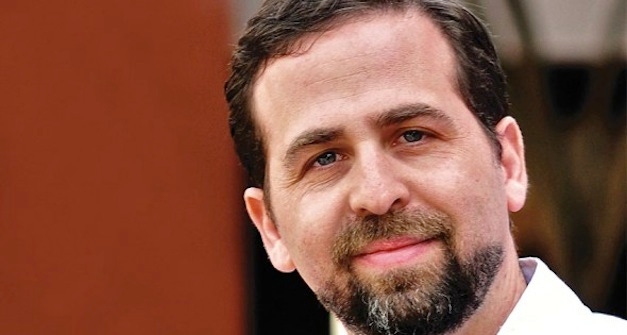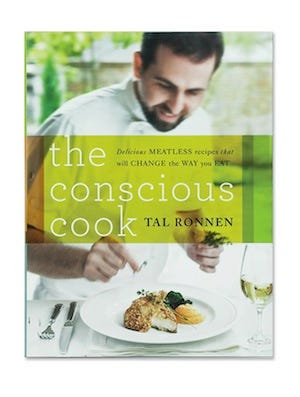Educate customers on vegan eating with chef Tal Ronnen
Organic Connections, the magazine of Natural Vitality, talks with chef Tal Ronnen--one of Lyfe Kitchen's executive chefs--about the many benefits of going vegan. Here's information you can share with your vegan or transitioning-to-vegan shoppers.
June 10, 2013

 Chef Tal Ronnen set out to make a point: vegan, meatless cooking can equal or better “regular” carnivore fare.
Chef Tal Ronnen set out to make a point: vegan, meatless cooking can equal or better “regular” carnivore fare.
His success is attested by some people you may have heard of. We’re talking about Oprah Winfrey, who, in the spring of 2008, hired Ronnen to prepare meals for her 21-day vegan cleanse. And Ellen DeGeneres, who retained Ronnen to cater for her and partner Portia de Rossi’s vegan wedding. Ronnen was also Arianna Huffington’s chosen chef for her party at the Democratic National Convention, and he catered the first vegan dinner at the US Senate as well. He even assisted Chrissie Hynde of the Pretenders in opening her restaurant, VegiTerranean, in her home town of Akron, Ohio.
Finding true flavor
The sumptuous tastes that so many are raving about are exactly what Chef Ronnen was seeking when he embarked on this path. “It was actually out of sheer frustration from growing up with really good food and parents that were foodies,” Ronnen told Organic Connections. “When I crossed over to eating a vegetarian diet, I noticed that I was being served side dishes that were coming out with my family’s regular dishes. There was not a protein component—it was just an afterthought. That kind of inspired me to learn how to cook traditionally, first, and then to apply that to vegetarian, then vegan, cooking.”
It was clearly more than just a mission of personal eating: Ronnen was out to literally change the world of vegan cooking. “I think for the most part that, in the past, when you dined out in order to eat vegan food, what you’d find was sort of left over from the hippy movement of the sixties and seventies—a lot of brown rice, hummus, sprouts and things like that. Those are all great, but you’re not going to win over a diehard carnivore with those types of dishes. So I like to create meals that I remember eating as a child or even as a teenager that inspire me to make vegan versions of them. My mission is just to prepare great-tasting food that appeals to people of all walks of life: vegetarians, carnivores, flexitarians and everyone in between.”
Ronnen cites an example from his current menu. “At my new restaurant, Crossroads, we do a take on oysters on the half shell,” he explained. “We use an artichoke leaf as an oyster shell with an artichoke purée, a crispy oyster mushroom that’s been seasoned with nori to give it a seafood flavor, and a yellow tomato Béarnaise sauce and kelp caviar. It’s really indulging food.”
Chef Ronnen’s culinary mastery has brought him into several unique positions. He has taken his expertise to some of the top vegan restaurants in the United States, including Sublime in Fort Lauderdale, Madeleine Bistro in Los Angeles, and Candle 79 in New York City. He worked with Wynn Las Vegas executive chefs to create vegan menus for 22 restaurants in the famed hotel, and he has conducted workshops with students and staff at Le Cordon Bleu campuses nationwide.
Like what you're reading? Subscribe to the Organic Connections e-newsletter.
Lyfe Kitchen
Recently, the launching of Lyfe Kitchen’s chain of fast-casual healthy food restaurants became headline news due to the involvement of Mike Roberts, former global president and COO for McDonald’s Corporation. When Roberts became Lyfe Kitchen’s president and CEO for Restaurant, he asked Tal Ronnen to be one of the two executive chefs.
It was through Lyfe Kitchen’s president and CEO for Grocery, Stephen Sidwell, that Ronnen became involved. “I got introduced to Mike Roberts by my friend Stephen Sidwell, whom I was working with,” Ronnen related. “He asked me if I wanted to be a part of it, and I said, ‘Of course.’ I’m working with someone who has the systems and operations for bringing food to the masses now wanting to focus on organic, vegetarian healthy food. I couldn’t think of a better way to spend my time as a chef. I create all of the plant-based vegan dishes on the menu for Lyfe.”
Obviously Ronnen is very much behind Lyfe Kitchen’s mission. “It will introduce people to eating healthy food, but in a familiar format,” he said. “It will acquaint them with new ingredients; everything is under 600 calories; there’s a sodium cap—a lot of benefits to eating at Lyfe. And the plan is to expand to 250 locations in the next five years.
“It’s not fast food—we call it ‘fast casual.’ Fast-food restaurants have a three- to five-minute ticket time. We’re at about eight minutes, so you sacrifice a little bit of time to get quality food. There’s no deep fryer in the restaurant. Everything is made fresh and cooked fresh to order.”
Standing at the crossroads
As one might imagine, a restaurant Ronnen himself opened would be quite unique—and his brand-new Los Angeles–based Crossroads restaurant certainly is. “We’re bringing Mediterranean food to LA that just happens to be vegan,” he said, “and the word vegan isn’t even on the menu.
“It’s unique because it’s in a fine-dining environment but everything is small plate, ranging from $6 to $14, so you can try many different things. Unlike a lot of vegetarian restaurants there’s a theme. In some vegetarian or vegan restaurants you can get miso soup and a burrito and a Reuben, yet those cuisines have nothing to do with each other. I guess that’s fun for some people, but at Crossroads the food is all going to go together across the board, whether it’s a salad or soup or a small hot plate. It’s very cohesive.”
Diners can choose from a variety of mouth-watering dishes, such as Morel Mushroom Gravy with house-made Focaccia Biscuits; Herb Risotto–Stuffed Banana Peppers with Basil Lime Beurre Blanc; and Caramelized Leek Flatbread with Crispy Root Vegetables. Dessert options on the menu include Chocolate Bundt Cake with Chocolate Whiskey Sauce, and Carrot Cake Ice Cream with Candied Carrot Chips.
The name is indicative of the clientele Ronnen and his partners wish to attract to the restaurant. “My partner Steve Bing came up with the name,” said Ronnen. “They were sitting around trying to think of a name that didn’t scream vegan or green, and something that everyone would feel comfortable with. This will be a crossroads for a lot of people—vegetarians, vegans and carnivores all dining in the same restaurant and having a good time together.”
Ronnen has seen to the business side of Crossroads as well. Partner Steve Bing is the founder of the Shangri-La business group, an organization with interests in property, construction, entertainment and music. Another partner is Parnell F. Delcham, CEO of United Culinary Artists; Delcham has previously overseen several different restaurant groups and the opening of many concept restaurants. The kitchen is helmed by executive chef Scot Jones, who is best known for having been executive chef at Chrissie Hynde’s VegiTerranean restaurant.
“We’ve got a really great team,” Ronnen pointed out. “It’s a group of very talented people from the restaurant industry. They’ve come together to create this concept, and I think that’s unique in itself. A lot of vegetarian or vegan restaurants are opened by very well-intentioned people, but they might not necessarily be savvy in the restaurant business.”
The local and sustainable difference
Many top chefs, including Alice Waters, Wolfgang Puck, Rick Bayless and Dan Barber, have discovered the flavor difference in local, seasonal and sustainably grown ingredients. Tal Ronnen is no exception—and Crossroads most assuredly utilizes them. “We’re a seasonal restaurant,” he said. “Anything that we cook with is at the peak of its season and tastes as good as it’s going to get. When you start using ingredients that are out of season and flown from halfway across the world, that’s when they don’t taste as good. So cooking seasonally and using organic ingredients definitely makes our dishes.”
no exception—and Crossroads most assuredly utilizes them. “We’re a seasonal restaurant,” he said. “Anything that we cook with is at the peak of its season and tastes as good as it’s going to get. When you start using ingredients that are out of season and flown from halfway across the world, that’s when they don’t taste as good. So cooking seasonally and using organic ingredients definitely makes our dishes.”
The sourcing of local ingredients has been in place since Crossroads’ opening. “We have a really unique partnership with LA Specialty,” Ronnen continued. “LA Specialty is a great group that does what I would normally do on a Sunday, and that’s go to the farmers’ market. They basically do that for us and bring local, sustainable and organic produce to our restaurant. That’s where we get most of our produce.”
But it’s not just the flavor that has influenced Ronnen—it is the health issues associated with conventionally grown produce. “We just had training with our front-of-the-house staff and they asked what inspired me to order all organic,” Ronnen said. “I told them we’re ordering mostly organic, but where we don’t think it makes sense—like if there is a local farmer that hasn’t gotten USDA certification but has organic farming practices—I’m cool with that. To me, it’s looking at it on a case-by-case basis.
“I also explained to them that I choose to cook with organic ingredients not so much for what people think is important with organic, which is largely pesticides—although that is important; but GMO food and irradiated food are bigger reasons for me. I explained to them why we wouldn’t want genetically modified or irradiated foods, especially with some of the conventional produce being sold to restaurants being irradiated. They were surprised; they thought organic just meant no pesticides.”
Spreading the word
Ronnen is not simply serving his cuisine to patrons; he is also spreading it through the printed word. Not long after his first appearance on Oprah, he released a cookbook entitled The Conscious Cook: Delicious Meatless Recipes That Will Change the Way You Eat (William Morrow, 2009).
Interestingly, it wasn’t originally targeted at the home kitchen. “I created it to fill a void,” said Ronnen. “There wasn’t a vegan cookbook that I could pass on to my peers. I know a lot of chefs who cook meat and work at hotels, and they said, ‘Hey, Chef, give me a cookbook that I can learn from,’ and I really couldn’t think of one. There were a couple but there wasn’t a wide variety; so I wanted to write a book that really spoke to chefs, and that’s what I did. With Oprah Winfrey’s support, when she had the book featured on her show, and also with Ellen’s, it was the first vegetarian cookbook to make the New York Times bestseller list for six weeks in a row.”
The recipes contained in The Conscious Cook can also, of course, be utilized by home chefs—of the more patient variety. “Definitely a lot of people enjoy it at home, but some people are a little intimidated by the recipes,” Ronnen remarked. “Everyone is pitching these 30-minute meals and microwave meals, and I’m not about that; everything I do is from scratch. So when people see that a recipe takes an hour or an hour and a half, some don’t have time for that and I think that’s kind of sad. People used to spend all day cooking and now they’re afraid of an hour recipe.”
Nevertheless, it is certain that through his cookbook as well as national television publicity, through educating others and cooking for major culinary venues, Chef Ronnen is changing the landscape of how the world views vegan cuisine.
Tal Ronnen’s book, The Conscious Cook, is available from the Organic Connections bookstore.
You May Also Like


